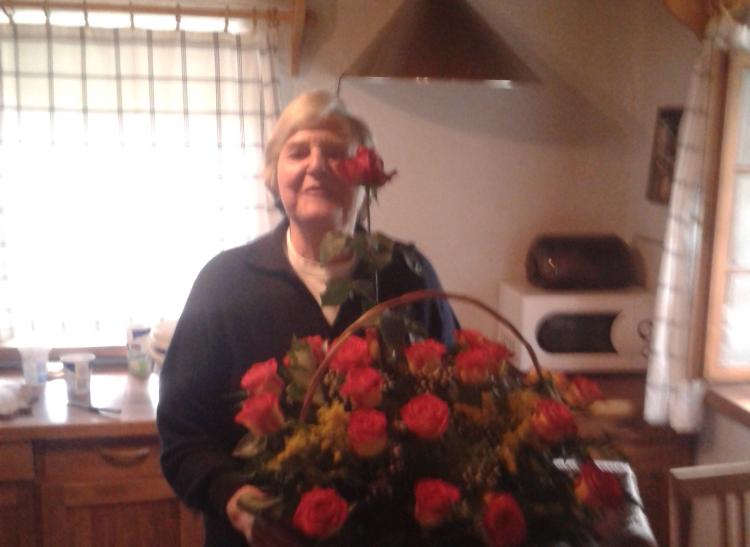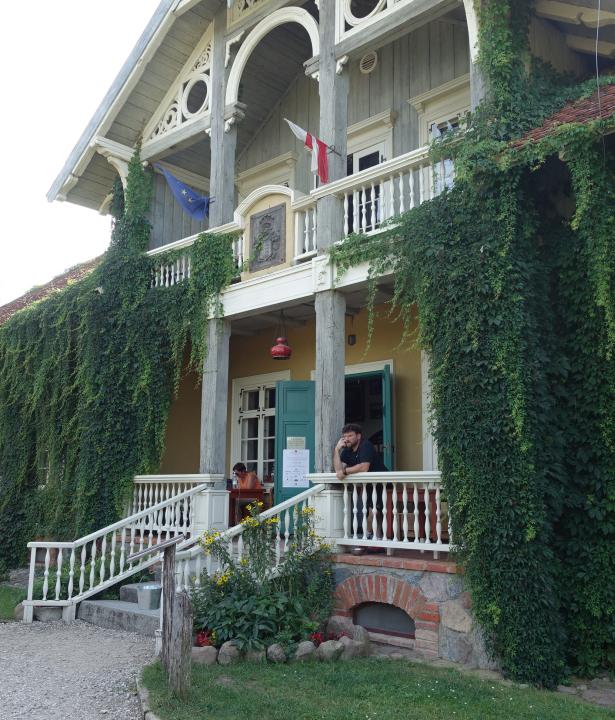Wolfgang Crasemann, a nephew of the famous journalist Renate Marsch-Potocka, has used interviews and personal documents - originally for his own family - to write down her life story and pay tribute to her contribution to German-Polish understanding. This previously unpublished text tells of her popularity in both countries in the years before 1989.
Text
"People had confidence in Renate because she could speak Polish, was really interested in the Poles, listened well, helped them whenever possible, and she never got the interlocutors in trouble for speaking frankly. Sometimes communications were conducted in secret. When people laid flower crosses for the Solidarność (Solidarity) and Renate was present, she was sometimes passed notes with hidden messages, unnoticed by the security services, which she was able to understand very well.
Renate became properly well-known through the weekly press conferences to which she was invited by the government spokesman Jerzy Urban. Since the government wanted to show its openness, press conferences were broadcast on television with a time delay. The next day, they were reported in detail in the government newspaper Rzeczpospolita. The foreign correspondents took advantage of this by asking critical questions. Renate stood out because she was able to ask her questions in Polish. She also included information in her critical questions, for example about protests and mismanagement, which would not have otherwise reached the Polish public.
Soon she became a media star, because the news program on the main television channel was watched by the vast majority of people at that time. Renate was virtually the spokesperson of the public against the hated regime. On one occasion she managed to obtain a list of political prisoners from the opposition circles, read out some of the names on air and asked specifically on what grounds the prisoners had been arrested and when they would be released. In this way, she unexpectedly helped some prisoners to be freed, because the state authorities respected Western journalists and wanted to avoid unnecessary trouble with foreign countries...
Renate's high profile meant that she was often approached by people on the street. Complete strangers would hug her, kiss her and encourage her to continue asking these liberating questions. People slipped her messages, often just wanting to thank her for the courage she showed in attending press conferences. Renate always spoke about Poland and the people with great respect. People realized that she loved the country and the Poles and, in return, the Poles loved their “Pani Renate”. It was definitely a strong emotional relationship. Later on, Renate was also a regular guest on the program "Bliżej świata" (Closer to the World) on the second channel of Polish state television, which was considered a bit more liberal than the first. It was a regular political program featuring foreign journalists and was broadcast from 1987 to 1991.
Renate also became known in Germany. Her reports on Poland appeared in newspapers, radio broadcasts and even on television. She featured, for example, on the WDR radio station during the German meeting of Silesians on 16.6.1985. She reported about the fears of the Poles when speakers at the meeting talked about wanting to keep the Germany question open and said that Germany was bigger than the FRG. She appeared on Werner Höfer's ARD Sunday program "Internationaler Frühschoppen" and reported on conditions in Poland to an illustrious panel of journalists. Later, she was on the program "Boulevard Bio" together with Lech Wałęsa. Renate was mainly concerned with the welfare of the opposition members and their relatives. For example, she provided Lech Wałęsa's wife and children with clothing and baby food when he was in prison."
Renate became properly well-known through the weekly press conferences to which she was invited by the government spokesman Jerzy Urban. Since the government wanted to show its openness, press conferences were broadcast on television with a time delay. The next day, they were reported in detail in the government newspaper Rzeczpospolita. The foreign correspondents took advantage of this by asking critical questions. Renate stood out because she was able to ask her questions in Polish. She also included information in her critical questions, for example about protests and mismanagement, which would not have otherwise reached the Polish public.
Soon she became a media star, because the news program on the main television channel was watched by the vast majority of people at that time. Renate was virtually the spokesperson of the public against the hated regime. On one occasion she managed to obtain a list of political prisoners from the opposition circles, read out some of the names on air and asked specifically on what grounds the prisoners had been arrested and when they would be released. In this way, she unexpectedly helped some prisoners to be freed, because the state authorities respected Western journalists and wanted to avoid unnecessary trouble with foreign countries...
Renate's high profile meant that she was often approached by people on the street. Complete strangers would hug her, kiss her and encourage her to continue asking these liberating questions. People slipped her messages, often just wanting to thank her for the courage she showed in attending press conferences. Renate always spoke about Poland and the people with great respect. People realized that she loved the country and the Poles and, in return, the Poles loved their “Pani Renate”. It was definitely a strong emotional relationship. Later on, Renate was also a regular guest on the program "Bliżej świata" (Closer to the World) on the second channel of Polish state television, which was considered a bit more liberal than the first. It was a regular political program featuring foreign journalists and was broadcast from 1987 to 1991.
Renate also became known in Germany. Her reports on Poland appeared in newspapers, radio broadcasts and even on television. She featured, for example, on the WDR radio station during the German meeting of Silesians on 16.6.1985. She reported about the fears of the Poles when speakers at the meeting talked about wanting to keep the Germany question open and said that Germany was bigger than the FRG. She appeared on Werner Höfer's ARD Sunday program "Internationaler Frühschoppen" and reported on conditions in Poland to an illustrious panel of journalists. Later, she was on the program "Boulevard Bio" together with Lech Wałęsa. Renate was mainly concerned with the welfare of the opposition members and their relatives. For example, she provided Lech Wałęsa's wife and children with clothing and baby food when he was in prison."
Text
English translation: William Connor



